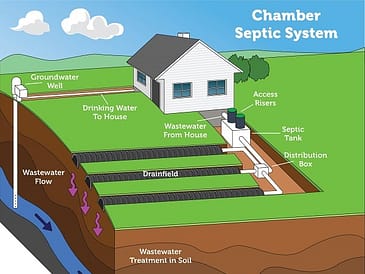Michigan is home to more than one million on-site septic systems that serve 1.3 million households, managing waste by pumping it through underground tanks to separate solids from liquids before seeping into the soil. But these systems often malfunction, leaking raw sewage into drinking water wells and lakes.
WEMU’s David Fair analyzes proposed legislation that could set state standards for septic system design, siting, maintenance and inspection as well as authorize local health departments to oversee these programs.
Septic Tank
Septic systems provide households without municipal sewers a safe way to dispose of household waste in areas without municipal sewers, transporting it via underground tanks into the soil for processing. Unfortunately, septic systems don’t last forever: Michigan environmental regulators estimate that failing septic systems discharge 9.4 billion gallons annually into soil and environment that causes sickness among humans as well as polluting lakes, rivers and waterways with high concentrations of untreated sewage pollution that often results in algae blooms.
Heavy solids in a septic system settle to the bottom, where bacteria decompose them into sludge and gases, while lighter solids, such as oils and fats, rise to form a scum layer at the surface. Septic tanks typically made of concrete or high-quality plastic should be situated at least 50 feet from any source of drinking water such as wells or sources that deliver drinking water, on land that slopes away from lakes or rivers, for optimal performance.
Some local health departments use point-of-sale inspections to ensure septic systems are working as expected, according to Ladouceur. But this approach to enforcement can only go so far, she notes. “As an inspector, I can’t really tell whether a septic system is causing issues until there are major incidents such as back ups or pooling in someone’s yard,” she states. Additionally, because these invisible infrastructure pieces don’t appear until something goes wrong; therefore people usually forget they exist altogether when functioning well.”
Maintaining an effective septic system is of utmost importance to both homeowners and our waterways, so the state needs a comprehensive set of rules regarding installation, maintenance and monitoring to achieve this objective.
House and Senate lawmakers recently proposed bipartisan bills to set standards for septic systems and require regular state inspections, with support coming from public health, environmental, real estate industry groups as well as conservation groups. Conservation groups oppose adopting such standards at such low levels that it causes more harm than good; and when it comes to state inspections triggering them; current attempts were plagued with indecision on which event triggers one; currently proposed by House would tie inspections to property transfers which is being widely criticized as inefficient by real estate industry groups.
Drain Field
Michigan is home to hundreds of thousands of homes with septic systems that are failing, sending raw sewage directly into groundwater, lakes and rivers and potentially spreading E. coli bacteria which cause illness among swimmers. Furthermore, oil and grease leakage from failing systems could make swimmers sick as well.
Problems associated with septic systems are difficult to address. Since these systems are hidden underground, people may not realize there’s an issue until their basement becomes inundated with sewer waste or they find evidence of leakage in their yard – and when a problem does surface it can often prove costly to address.
Septic systems featuring cutting-edge technology, including a more durable tank and perforated pipes set in gravel, are an ideal solution. However, it’s essential that children, pets and vehicles remain away from any potentially hazardous areas near a septic system; excessive rainfall, winter flooding tables or sea flooding may interfere with its proper operation as well.
Homeowners can lower the risk of failure by closely monitoring their septic systems. Conducting regular maintenance tasks is also helpful; additionally, having your tank professionally inspected every three to five years would also be wise.
At this stage, the tank should be pumped out and its pipes should be checked for cracks or other forms of damage. Furthermore, the septic system must also be assessed to ensure adequate levels of sludge and solid waste are present; also essential is making sure your septic tank fits the requirements so your drain field won’t become overwhelmed.
Another key tip for those owning a septic system is keeping their absorption field free of large objects such as play structures and storage buildings that could damage tanks or clog drain field perforations pipes. Planting grass or shallow-rooted plants over it will help preserve its integrity.
Statewide regulations of septic systems have been attempted numerous times by the Legislature, but never made it past committee. With public health departments preoccupied with managing COVID-19 pandemic cases, little focus has been given to this issue. Some local governments are taking notice: eleven counties and townships now mandate pre-sale inspection of a home’s septic system before its sale is finalized.
Distribution Box
Your household wastewater must be properly treated and disposed of; you are ultimately responsible for its treatment and disposal. Typically this is achieved using a septic tank and drain field; in which the former digests organic waste before filtering out any floatable solids from effluent for disposal in an absorption field through perforated pipes.
A distribution box helps distribute wastewater across different areas of an absorption field by using gravity to do this, and usually being located downhill from your septic tank. It features openings with rotating devices to help ensure even distribution – without one, waste may collect unevenly and oversaturate one area, rendering your drain field ineffective.
If your septic system distribution box appears to be malfunctioning, you should arrange for an inspection. Many factors could impact the function of your distribution box including its location, weather conditions and improper maintenance practices. A non-level distribution box could cause the distribution of waste water unevenly leading to leach field failure.
Pumping and cleaning regularly will keep your septic system in optimal working condition, protecting it from the damaging environment within it, including toxic gases and bacteria that build up over time.
Mismanaging a septic system can have serious repercussions for both your property and health, so take caution in what goes into it, such as using garbage disposals and grinders – they significantly increase solids entering the tank and absorption field, leading to further problems.
Locate and easily access all components of your septic system so you can perform maintenance or repairs, without damage occurring due to landscaping work or yardwork that could potentially harm them and require costly repairs later on. In addition, try not to build structures such as swimming pools or decks that could block access to either its tank or distribution box.
Permits
Michigan lakes have long been plagued with brown algal blooms caused by numerous factors, including septic systems. To combat this problem, legislators introduced two bills which would require all septic systems to meet stricter standards; passing either of these bills could significantly improve water quality in Michigan lakes.
These bills have been sent to the House Local Government Committee, where they could be debated as early as late 2018. If you want to support these bills and urge your representative to support it, reach out.
Current regulations surrounding septic systems vary considerably across the state. Certain counties have stringent requirements while others allow homeowners to go entirely off grid. Some communities even prohibit residents from discharging greywater into bodies of water – this regulation could have serious ramifications on local lake health.
In most areas, new construction or additions to homes with on-site sewage systems must receive approval from the Environment Health Division before being built or expanded upon. This involves conducting soil tests to make sure that their site can accommodate such systems without endangering ground water quality or creating other environmental issues.
Michigan Department of Environmental Quality estimates there are approximately 1.3 million septic systems across Michigan; of these systems, over 100,000 are failing or nonfunctioning correctly and this represents an enormous issue that must be addressed immediately. Michigan Water Research Institute estimates it will cost $35 billion over 10 years to repair these failing systems.
The new legislation seeks to establish minimum standards for septic system design, maintenance and inspections as well as establish a technical committee to advise the Michigan Department of Environmental Quality regarding recommended management standards.
This bill would also establish a point-of-sale inspection requirement for all septic systems, providing public health officials with an important tool to identify failing or ineffective systems and take corrective actions accordingly. Washtenaw County saw significant success with their point-of-sale program identifying approximately 18% of failing systems that needed replacing or repair, making this inspection program invaluable for public health officials.




